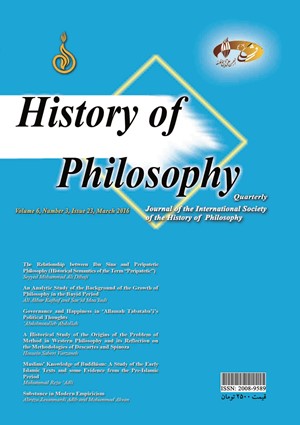-
-
List of Articles
-
Open Access Article
1 - سخن سردبير
Hossein Kalbasi Ashtari -
Open Access Article
2 - The Relationship between Ibn Sina and Peripatetic Philosophy (Historical Semantics of the Term “Peripatetic”)
Seyyed Mohammadali Dibaji -
Open Access Article
3 - An Analytic Study of the Background of the Growth of Philosophy in the Buyid Period
Ali Akbar Kajbaf Sae‘id Moa’kedi -
Open Access Article
4 - Governance and Happiness in ‘Allamah Tabataba’i’s Political Thoughts
Abdolmotalleb ‘Abdollah -
Open Access Article
5 - A Historical Study of the Origins of the Problem of Method in Western Philosophy and its Reflection on the Methodologies of Descartes and Spinoza
Hossein Saberi Varzaneh -
Open Access Article
6 - Muslims’ Knowledge of Buddhism: A Study of the Early Islamic Texts and some Evidence from the Pre-Islamic Period
Muhammad Reza ‘Adli -
Open Access Article
7 - Substance in Modern Empiricism
Alireza Javanmardi Adib Mohammad Akvan
-
The rights to this website are owned by the Raimag Press Management System.
Copyright © 2017-2026







